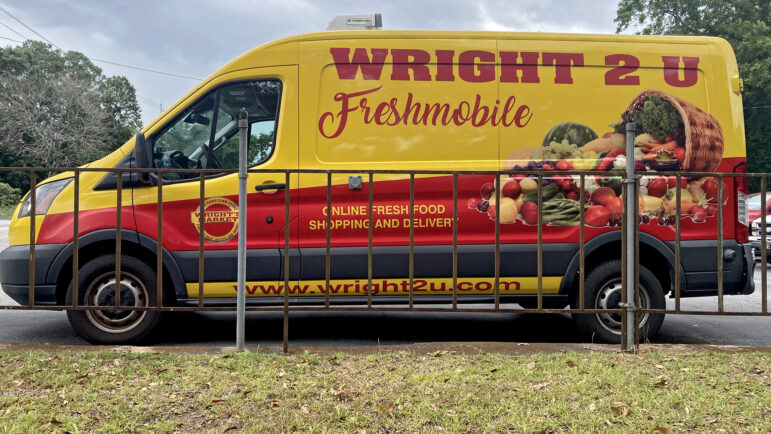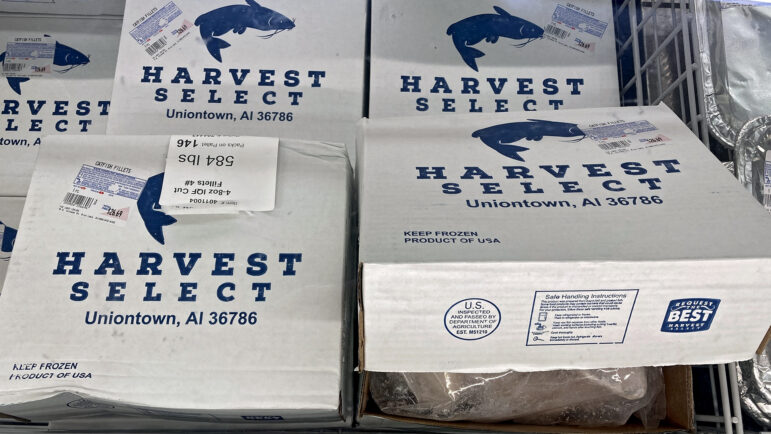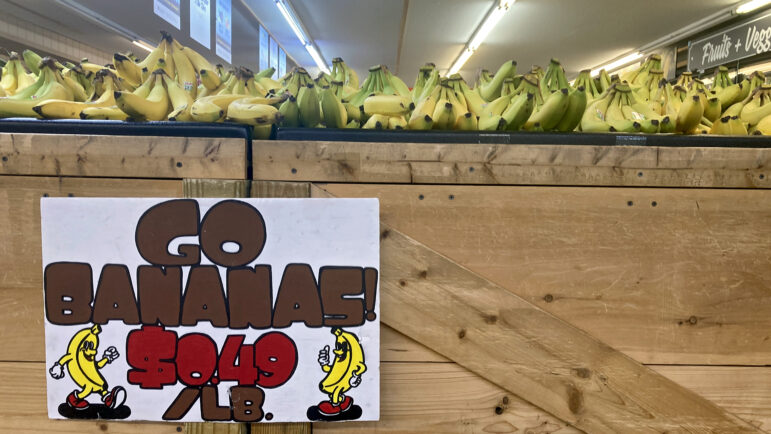Independent grocery stores have had a tough five years. SNAP cuts will make it harder
Wright’s Market owner Jimmy Wright stands inside his story in Opelika, Alabama on July 17, 2025. Wright worries cuts to SNAP will cause smaller grocers to shut down.
The last five years have aged Alabama grocer Jimmy Wright like they were two decades. It started with COVID. And then inflation – including the “great egg debacle,” as Wright called the recent price spike.
Now, he and other grocers are facing a new challenge: cuts to the federal Supplemental Nutrition Assistance Program (SNAP), better known as food stamps.
SNAP helps lower-income families in the U.S. pay for groceries — which in turn, means business for grocery stores. For many independent grocery stores, SNAP makes up the bulk of their sales.
Similar to hospitals worrying about their financial future due to Medicaid cuts in President Donald Trump’s signature domestic policy bill, SNAP cuts have grocers and their advocates worried.
Many grocers may have to trim their own budgets. For some small stores in impoverished areas with few nearby alternatives for shoppers, the only option could be closing permanently.
‘It hurts where people need it the most’

The signs of the importance of SNAP at Wright’s Market in Opelika, Alabama — Auburn’s sister city — literally hang across the store.
One floating by the sweet potatoes advertises that SNAP users can buy twice as many veggies for the same price when paid for with their EBT card, which holds their SNAP benefits like a debit card. Another sign lets customers know that the card makes skim and 1% milk half off. This store was also the first in the Southeast to accept SNAP payments online.
Altogether, about a third of the store’s sales come from SNAP, according to Wright, while only about 15% of Opelika households receive SNAP. Wright believes he gets so much business from the program because they treat those shoppers, who are often stigmatized, with dignity.
“You hear stories where, when people produce an EBT, maybe they’re not treated as nice as somebody else is,” Wright said. “We’re not gonna allow that to happen in our store.”
Grocery stores in the U.S. typically get about 12% of their sales through SNAP, according to the National Grocers Association. But that number can go as high as 70% for some independent grocers in low-income areas — both urban and rural communities that might otherwise be food deserts.These are the stores at the highest risk of closing due to SNAP cuts.
“It hurts where people need it the most,” said Ken Kolb, professor of sociology at Furman University.
Bracing for losses

Those percentages also undersell how much business SNAP can bring to a store.
As the “supplemental” in the name implies, the program is only designed to cover a portion of a family’s grocery costs, not all of it. While someone might spend SNAP dollars at Wright’s stores, they’ll likely buy more out-of-pocket.
Every dollar sold, SNAP or otherwise, matters in a literal penny business. Profit margins tend to be around one or two percent, according to Wright and NGA.
The new changes for SNAP will cut federal spending by about $187 billion over the next 10 years, according to analysis by the nonpartisan Congressional Budget Office (CBO). An earlier analysis from the CBO found about three million people could be kicked off the program due to new work requirements.
Wright isn’t concerned about the lost SNAP sales shutting down his own store, but he is bracing for how to make up for the losses.
The last two things he wants to do are raise prices or cut employees — which gets to another bit of SNAP grocery math. Every additional dollar of federal SNAP spending creates about $1.50 in economic activity, according to a 2019 U.S. Department of Agriculture paper. That includes creating jobs directly at the store, along with spurring other business — like needing to pay a landscaping company to maintain a grocer’s storefront or more foot traffic coming in that can stop by neighboring retailers.
The NGA estimates SNAP funding supports about 388,000 jobs.
“SNAP isn’t just a vital safety net for families,” Stephanie Johnson, the group vice president of government relations for the NGA, said. “It’s also a powerful economic driver.
Washington shifts SNAP burden to states

The Urban Institute estimated that 5.3 million families will lose, on average, $146 per month, based on part of the law capping payment increases based on inflation. The law also offloads some of the program’s expenses onto states.
Republican Sen. Tommy Tuberville, of Alabama, told Politico that he’s concerned about his state’s ability to afford that. Tuberville still voted for the law and Republicans argue that SNAP has become bloated and wasteful.
Republican House Speaker Mike Johnson pointed to an increase in fraudulent SNAP payments as part of the justification for the changes. Those fraudulent charges, however, aren’t from SNAP beneficiaries, but from scams that target them. Fraudsters set up skimming machines on payment terminals and use that to drain those benefits for their own use.
Skimmers were even installed at Wright’s store. A group of men were able to set up the devices on his payment machines. Wright spotted it quickly after the men drew his suspicion. He said he spent $8,000 dollars replacing the pen pads and installing anti-skimming devices.
Wright hopes he can make up for the SNAP sales losses by being more efficient, including testing AI to see if it can help decide what he should put on sale, and when the best time for it is.
Wright said he won’t throw stones at the politicians who voted for the cuts, believing they are doing what they think is best for the country. Now that it’s done, he said it’s on him to figure out the best way to continue to serve his hometown – a job he said he’s still blessed to have.
“I still think I am living the American Dream and have the best job in the world,” Wright said.
A correction was made on July 29, 2025: An earlier version of this story included a quote from the National Grocers Association that said SNAP supported about 188,000 jobs. The organization sent a May study after publication with an updated total.
A correction was made on July 31, 2025: An earlier version of this story listed an incorrect figure concerning cuts to SNAP benefits based on a previous version of the “One Big Beautiful Bill.” The latest estimate from the Congressional Budget Office says the changes to SNAP will cut about $187 billion over 10 years.
This story was produced by the Gulf States Newsroom, a collaboration between Mississippi Public Broadcasting, WBHM in Alabama, WWNO and WRKF in Louisiana and NPR.
Pentagon says it’s cutting ties with ‘woke’ Harvard, ending military training
Amid an ongoing standoff between Harvard and the White House, the Defense Department said it plans to cut ties with the Ivy League — ending military training, fellowships and certificate programs.
‘Washington Post’ CEO resigns after going AWOL during massive job cuts
Washington Post chief executive and publisher Will Lewis has resigned just days after the newspaper announced massive layoffs.
In this Icelandic drama, a couple quietly drifts apart
Icelandic director Hlynur Pálmason weaves scenes of quiet domestic life against the backdrop of an arresting landscape in his newest film.
After the Fall: How Olympic figure skaters soar after stumbling on the ice
Olympic figure skating is often seems to take athletes to the very edge of perfection, but even the greatest stumble and fall. How do they pull themselves together again on the biggest world stage? Toughness, poise and practice.
They’re cured of leprosy. Why do they still live in leprosy colonies?
Leprosy is one of the least contagious diseases around — and perhaps one of the most misunderstood. The colonies are relics of a not-too-distant past when those diagnosed with leprosy were exiled.
This season, ‘The Pitt’ is about what doesn’t happen in one day
The first season of The Pitt was about acute problems. The second is about chronic ones.







